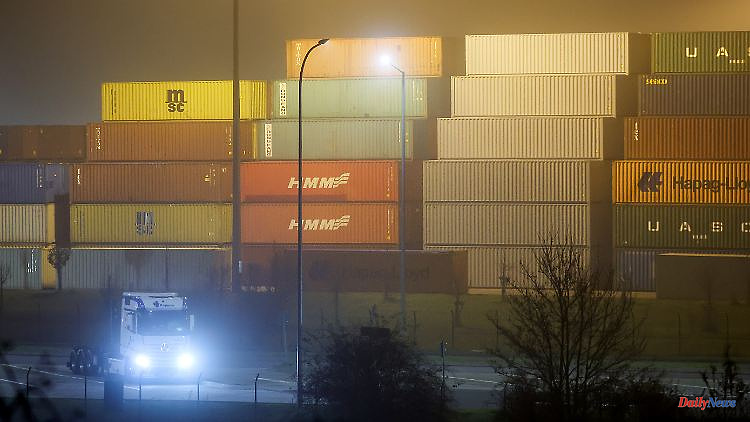Economists are worried about the latest foreign trade numbers. In November, "Made in Germany" was again less in demand worldwide. Economic experts are also rather pessimistic about the coming months.
German exports fell again in November. Compared to the previous month October there is a minus of 0.3 percent, said the Federal Statistical Office. Economists had expected slight growth of 0.2 percent. German exports had already declined in the two previous months. The picture is significantly better in a year-on-year comparison: There is a clear plus of 13.3 percent for November - also because of the increased prices.
Exports to the EU fell by 0.4 percent, exports to third countries fell by 0.1 percent, as the statisticians in Wiesbaden further announced. Most exports again went to the USA in November - but here, too, there is a minus of 1.5 percent compared to October. The volume of exports to China also decreased by 1.5 percent.
ING economist Carsten Brzeski said the "persistent weakness" in German exports shows fears of a recession are "real". The short-term outlook is anything but rosy. It could still be some time before a recovery in global supply chains and the world economy would also affect German exports. According to Brzeski, trade is no longer an engine of growth, but has become a stumbling block for German economic growth.
Thomas Gitzel, Chief Economist at VP Bank, says: "'Made in Germany' is no longer a driving force in times of a weaker global economy. Exports fell slightly in November. However, it should be added that price effects may have played a role. Since prices fell in the final quarter, especially in the area of raw materials, German exporters are unlikely to have pushed through their desired prices as well as was the case in the months before."
Alexander Krüger, chief economist at the private bank Hauck Aufhäuser Lampe, sees things a little more positively: "At the high level, the slight decline in exports can easily be coped with. Since China and the USA are weakening, the export dynamics will remain rather restrained for the time being. The export sector supports the prospect of a mild one Recession. A ray of hope comes from reduced material shortages."
German companies now have fewer problems procuring material. That was the result of a recent survey by the IFO Institute. However, some of the values are still well above their mean. "A dissolution of the bottlenecks now seems to be emerging in many sectors," said the head of the IFO surveys, Klaus Wohlrabe. "This will support the economy in the coming months."
However, there are still major difficulties in procuring material, especially in the key industries of the automotive and mechanical engineering sectors. Both are among the most important export industries in Germany.












